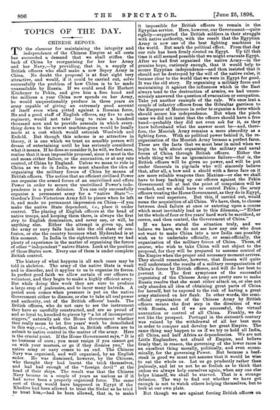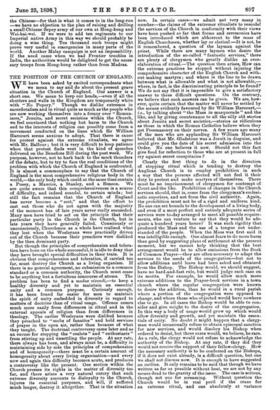TOPICS OF THE DAY.
CHINESE SEPOYS.
TO the clamour for maintaining the integrity and independence of the Chinese Empire at all costs has succeeded a demand that we shall stiffen the back of China by reorganising for her her Army and her Navy,—by providing, that is, a supply of British officers who shall make a new Sepoy Army in China. No doubt the proposal is at first sight very attractive, and would, if it could be carried out, solve successfully the problem of how China is to be made unassailable by Russia. If we could send Sir Herbert Kitchener to Pekin, and give him a free hand and the millions a year China now spends on her Army, he would unquestionably produce in three years an army capable of giving an extremely good account of itself even when pitted against a Russian force.
He and a good staff of English officers, say five to each regiment, would not take long to raise a hundred thousand men and to provide arsenals in which every- thing down to the newest machine-guns would be locally made at a cost which would astonish Woolwich and Enfield. But though this scheme is so attractive in theory, it is one which we trust no sensible person will dream of entertaining until he has seriously considered what it means. If he does so consider it, he will, we feel sure, realise that it is an impossible proposal, since it must in the end mean either failure, or the annexation, or at any rate control, of China by England. Unless we mean to rule in China as we do in India, we must abandon the idea of organising the military forces of China by means of British officers. The notion that an efficient civilised Power can organise the armed forces of an uncivilised and effete Power in order to secure the uncivilised Power's inde- pendence is a pure delusion. You can only successfully organise a permanent army for a " native State "- Gordon's Ever-Victorious Army fell to pieces when he left it, and made no permanent impression on China—if you make the native State dependent, i.e., place it under control. The placing of English officers at the head of native troops, and keeping them there, is always the first step to English domination, and never can, or will, be anything else. Either the attempt is given up, and the army or navy falls back into the old state of con- fusion, or else the country becomes what Hyderabad is at this moment. In India in the eighteenth century we had plenty of experience in the matter of organising the forces of other " independent" native States. Look at the position of those States now. Every one of them is under complete British control.
The history of what happens in all such cases may be told in skeleton. The army of the native State is weak and in disorder, and it applies to us to organise its forces. In perfect good faith we allow certain of our officers to volunteer, and they begin to make a highly efficient army. But while doing this work they are sure to produce a large crop of jealousies, and to incur many hatreds. A period soon comes when pressure is put on the native Government either to dismiss, or else to take all real power and authority, out of the British officers' hands. The British officers, who do not care to see the instrument they have so carefully constructed, and are so proud of and so loyal to, knocked to pieces by "a lot of incompetent niggers," naturally ask the Home Government whether they really mean to let five years' work be demolished in this way,—i.e., whether, that is, British officers are to submit to native control in the matter of the army. Here is the crucial point. If the Home Government says," It is no business of ours ; you must resign if you cannot get on with your masters, or go if they dismiss you," the native army or navy comes to an end. The Chinese Navy was organised, and well organised, by an English sailor. He was dismissed, however, by the Chinese, who thought they had learnt the trick themselves, and had had enough of the " foreign devil " at the bead of their ships. The result was that the Chinese Navy became in a couple of years as useless as if it had never been a properly organised force. The same sort of thing would have happened in Egypt if the :Khedive had been allowed to treat the Sirdaras he tried to treat him,—had he been allowed, that is, to make it impossible for British officers to remain in the Egyptian service. Here, however, our Government—quite rightly—supported the British soldiers in their struggle with native authority, with the result that the Egyptian Army is now one of the best fighting machines in the world. But mark the political effect. From that day our rule has been firmly riveted on Egypt. Up till that.
time it still seemed possible that we might evacuate Egypt. After we had first organised the native Army—in the genuine hope, curiously enough, that it would help to secure Egyptian independence—and then insisted that it should not be destroyed by the will of the native ruler, it became clear to the world that we were in Egypt for good..
It was the old story. By organising a military force and maintaining it against the influences which in the East always tend to the destruction of armies, we had uncon- sciously answered the question of evacuation or occupation. Take yet another example of the rule. We once lent a couple of infantry officers from the Gibraltar garrison to the Emperor of Morocco in order to organise a force which should secure his independence. But when the pinch came we did not insist that the officers should have a free hand—probably they did not even ask for it, as they knew beforehand what the answer must be—and, there- fore, the Moorish Army remains a mere absurdity as a fighting force. With no political power behind it, the re- organisation of the Moorish Army became a perfect farce.. These are the facts that we must bear in mind when we begin to talk about organising the military and naval forces of China through British officers. Either the whole thing will be an ignominious failure—that is, the British officers will be given no power, and will be put. under Generals in pig-tails who will sincerely believe that, after all, a bow and a shield with a fierce face on it are more reliable weapons than Maxims—or else we shall have to keep backing up our officers against the Pekin Government till at last the point of compulsion will be reached, and we shall have to control Pekin ; the army officers treating the Home Government, as they do in Egypt,. as their real superiors. But this, if carried out, would mean the acquisition of all China. We have, then, to choose between dead failure at once or entering upon a course which must inevitably lead us to this dilemma,—"Either let the whole of four or five years' hard work be sacrificed, or coerce, and then control, the Government of China."
If we have stated the situation truly, and we believe we have, we do not see how any one who does.
not want to make China into a new India can possibly wish us to undertake officially, or semi-officially, the organisation of the military forces of China. Those, of course, who wish to take China will not object to the proposal, for they will be prepared to assume control of the Empire when the proper and necessary moment arrives. They should remember, however, that Russia will quite well understand the results of a military reorganisation of China's forces by British officers, and will do her best to prevent it. The first symptoms of the successful organising of the Chinese Army are pretty sure to make Russia resolve that she must either attack us, or else not only abandon all idea of obtaining great parts of China for herself, but be exposed to the risk of having a great army stationed on her flank. In other words, the semi- official organisation of the Chinese Army by British officers means the first step in the direction of war with Russia, and if we are successful, the virtual annexation or control of all China. Frankly, we do not like the prospect. Portugal in the sixteenth century was ruined by the withdrawal of all her best men in order to conquer and develop her great Empire. The same thing may happen to us if we try to hold all India, all China, and half Africa as dependencies. We are not Little Englanders, not afraid of Empire, and believe firmly that, in reason, the governing of the lower races is an excellent thing morally, politically, and even econo- mically, for the governing Power. But because a beef- steak is good we must not assume that it would be wise to eat the whole ox. Let us go prudently rather than jealously, and let us not be so foolish as to think that unless we always help ourselves again, when any one else helps himself, we shall be starved. That is a strange delusion. The way to find out whether we have got enough is not to watch others helping themselves, but to look at our own plate.
But though we are against forcing British officers on the Chinese—for that is what it comes to in the long-run —we have no objection to the plan of raising and drilling a small Chinese Sepoy army of our own at Hongkong and Wei-hai-wei. If we were to add ten regiments to our Imperial native Army in this way we should probably be doing a wise thing. Ten thousand such troops might prove very useful in emergencies in many parts of the world. Another Malay campaign is not an impossibility. If the need came when we had Frontier troubles in India, the authorities would be delighted to get the neces- sary troops from Hong-kong rather than from Madras.



















































 Previous page
Previous page